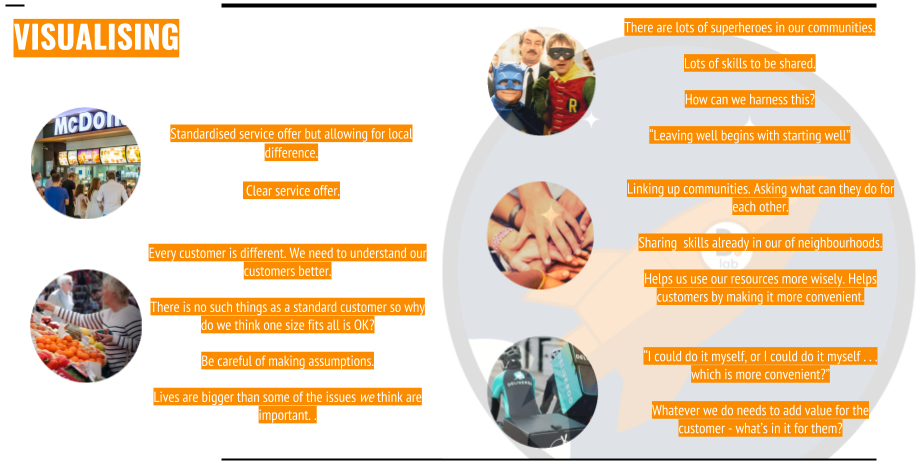Introduction
This was the third of our discovery sessions around the 10 ‘how might we’ questions that make up our current exploration pipeline.
Working out loud is one of our Lab guiding principles and we are really keen to share both our colleagues work and their ideas. We are sharing the high-level themes which emerge from each session, rather than waiting for them to be worked up into something more substantial. Following the sessions, the next steps will be for Innovation and Insight is to work up some solid test plans based on what we learned and we will, of course, be sharing more about those in due course.
Workshop Summary
The output from previous service design work formed the starting point.
This service area requires a significant amount of exploration. Moving to a true proactive servicing model requires a much better understanding of the way our customers use their homes.
We want to introduce elements of bespoke service to support the relationship with our customers. Accordingly, our model will introduce a limited range of service offers based on three factors:
The Home (age, condition, size)
Customer profile
Customer aspiration
The objective is to deliver a coaching approach that encourages customers to do more for themselves and each other. This, in turn, should reduce demand on reactive services and switch investment towards value creating proactive activities.
During the workshop, we asked colleagues to choose a picture from a random selection of images in order to help us all visualise the important factors at play. We wanted to create some left brain / right brain inspirational pairings which could take us out of our current sphere of reference and help us start to think analogously about a problem.
During the conversation that followed, some key fundamental principles emerged and colleagues were keen for us to test ways to bring each principle to life:
In all, colleagues came up with twelve high-level ideas which we boiled down into three main areas to focus on:
1. SHARING SKILLS:
We want to help those customers who would like to do more around their home through new services like Bromford Trade School or through the provision of helpful tips available via a range of media options.
We want to understand what skills our customers have that they could use to help others in their communities and what role Bromford should play in facilitating that network?
2. PARTS & MATERIALS:
We want to make it easier for customers to share tools and skills. What if we made it easier for customers to look up the parts they need and provide them at cost price for them to fit themselves or with the help of their neighbours? If we published our planned works schedule would this make it easier for customers to make decisions on what they do and when they do it?
3. INCENTIVES:
We want to look at the different ways we can help customers do more for themselves. How could we incentivise people to do work themselves and would an incentive help change customer behaviour anyway?
Some of the 'wild ideas' included:
- What if our Neighbourhood Coaches worked with communities to help develop ways for neighbours to share tools, skills and knowledge?
- What if we sent parts for small jobs directly to customer homes?
- What if Bromford opened a ‘trade school’ or introduced Engineer Coaches to work in the community?
- What if we created a service that would match ‘local heroes’ (customers with specific skills) to customers who need them?
We know that in order to move to a truly proactive service model we need to better understand the way our customers use their homes. The Lab will continue to explore this alongside developing a set of customer personas which will help us move away from one size fits no one services.
We will be working with colleagues in the coming weeks to look at developing some tests. A key priority will be around learning more about whether maintaining a home is different from repairing a home and the Lab plans to host further sessions on this important topic in the coming weeks.
Watch this space.
---




